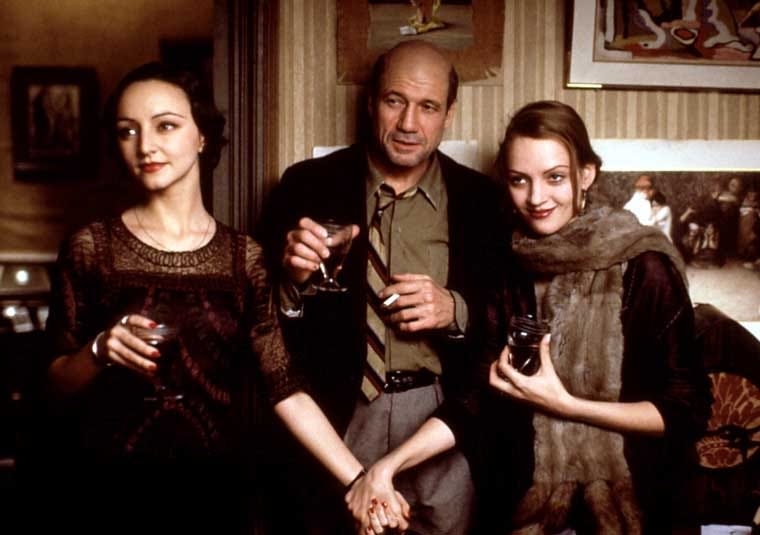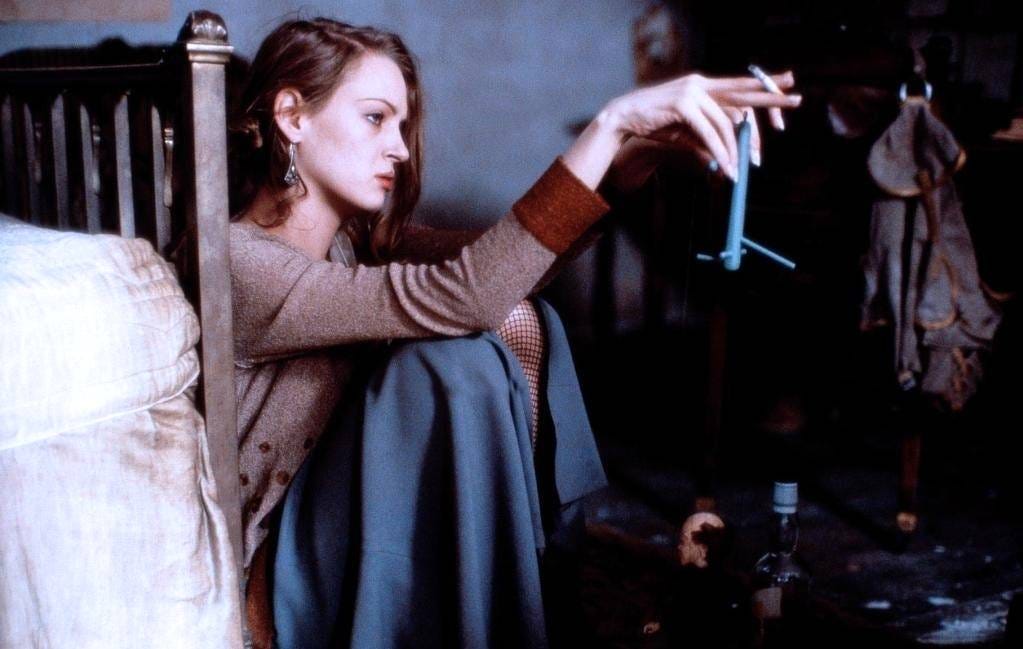henry & june
Film, 1990, 4 stars
Directed: Philip Kaufman
Written: Philip Kaufman and Rose Kaufman
I'm fascinated with stories about writers. Putting the lives of artists under a microscope reveals people who were as interesting as the stories they created. Sometimes, as with the story of Henry Miller and Anaïs Nin, the story reveals these people were great almost in spite of themselves. In this case the great artists were petty, cruel, selfish beings who seemed to understand nothing about life, yet turned this lack of understanding into powerful, erotic prose. That paradox is what makes this "based on a true story" account intensely interesting.
Henry & June is actually about four people: Anaïs Nin (Maria de Medeiros), her naive husband Hugo (Richard E. Grant), and their friends Henry Miller (the oddly yet perfectly cast Fred Ward) and his wife June (Uma Thurman). Nin is most famous today for her haunting and erotic diaries, on which much of this film was based. They tell the story of a woman waking to her own sexual possibilities, and are considered great feminist texts. If Nin was indeed anything in real life like she was portrayed in the film, she was a woman who barely understood her own sexual power. It was through her affairs with Henry, and their shared obsessive love for June, that she matured both as a woman, and as a writer.
The sex in this film is explicit, but it always serves a purpose for the story. The film explores the sometimes disparate reasons why people crave each other sexually. Sure, there's love, but there's also a thirst for understanding, and a desire to inflict pain upon oneself and others. There is revenge, hate, curiosity or just plain need. So many reasons, and so many choices the director needs to make to convey it realistically.
Through it all, this film belongs to Uma Thurman. For such a young actress (she was barely twenty when this film was made) she had a striking screen presence. Despite being onscreen for barely a third of the film, the remainder of this lengthy character study is marked by her absence and the lingering effect of June Miller upon everyone else. Through the depravity and longing, June sits above it all like the master manipulator she is, working her husband and her mistress as skillfully as she works the wooden puppet we see her perform with.
I don't want to make too much of the lesbian aspects of the film, as they were skillfully incorporated into the narrative as a whole. Anaïs is besotted with June, and to some extent June returns her love, as much a she is capable. The motivations of the lovers are difficult to fathom, but there is real heartbreak in Anaïs's eyes when her lovemaking with June degenerates into a vicious argument. The instinct for control pervades their relationship so much that, tragically, their real feelings are shut out.
The creative instinct that drives Anaïs and Henry both attracts and repels each other. They have between them a strange competition as to who can understand and convey on paper the enigma that is June. Also, even while they are fucking each other, there is a sense of oneupmanship, as to who can best take the experience away and bring it back within their living, vibrant prose. When June reads first Henry's novel about her, and then later on Anaïs's, she is appalled by both, angry that these people she loves can so misunderstand who she is. Despite their protestations to the contrary, not a single one of these people truly understands anything about each other.
Anaïs is a mystery to Hugo who loves her deeply, but he is content to not understand her as long as she is with him. Henry is unfathomable to Anaïs, but the desire to explore each other's talents is too strong for either to resist. All of them misunderstand June, who is at once more complicated and more simple than any of her many lovers, male or female, seem capable of grasping. It is only really the hapless Hugo who is at all true to himself. The rest of them exist in a haze of alcohol and sexual delusion and seem to be nothing more, in the end, than the sum of their own self-centred needs.
The period detail is exquisite, from the lush reds and purples of the interior design to the way Henry smokes his cigarettes. There's the smouldering temptress costumes the women wear and the decor in the whorehouse Henry visits and the lesbian clubs frequented by Anaïs and June. Each moment is lovingly crafted with a deft hand. This director really understands and revels in the beauty of the world he has created. Our first glimpse of June is on the silver screen as a black and white film goddess. Later we see her as a sozzled, labouring drunk. The visual fall from grace is almost as crushing as the emotional one. Henry & June encourages our voyeuristic instincts and is a prime example of how interesting depravity and decadence can be.



